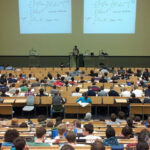
Farewell from under the Oak Tree
After 35 years writing for The Teaching Professor, Maryellen Weimer signs off with her final column.

After 35 years writing for The Teaching Professor, Maryellen Weimer signs off with her final column.

Earlier this year we asked you to share in-class small group activities and your best advice on various details related to designing and managing group

I have two loves: teaching and learning. Although I love them for different reasons, I’ve been passionate about both for all my career. I teach

I know, it’s not the time of year when most of us wildly love teaching, but I’m thinking across the long trajectory of my career.

How much has our thinking about participation changed? Start with your students: Do they equate participation with anything other than raising their hands to answer

You know, the one we all love to teach, the one whose learning showcases our pedagogical acumen. Does our vision of the ideal student at

Students need to learn time management skills, but I suspect that’s true for more than just students. Busyness rules. How many of us are living

My husband just took a wood-turning class, and the night before, he slept very little, worrying about his skills and whether he’d be able to

Last week I happened onto something I’d written years ago about study buddies—two students who agree to study together in a course. I was describing

We hear a lot about the unseemly influence of liberal professors and their inappropriate use of courses to promulgate left-leaning ideas. Some go so far

Magna Publications © 2024 All rights reserved